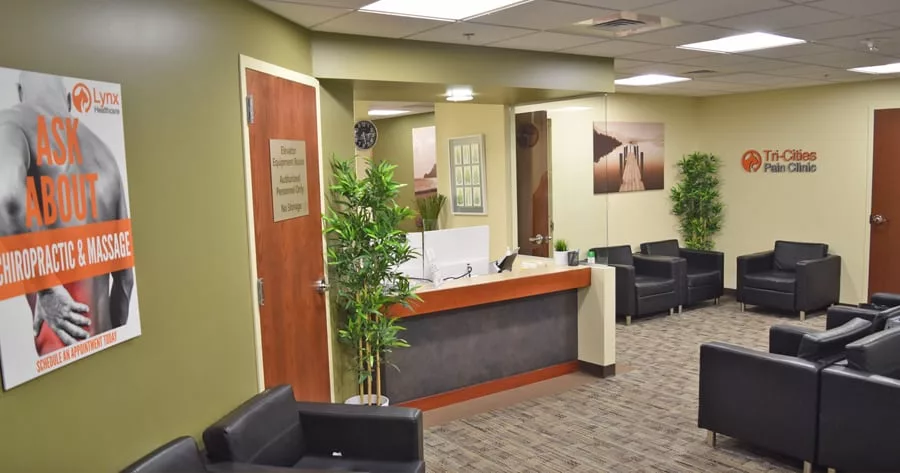
Home » Pinnacle Pain Center rebrands to Lynx Healthcare after renovations
Pinnacle Pain Center rebrands to Lynx Healthcare after renovations

February 14, 2017
By Sean Bassinger
Mid-Columbia residents seeking relief from chronic back, neck, arthritic, cancer or other chronic or acute pain have more options available to them with Lynx Healthcare’s recent Kennewick expansion.
Formerly Pinnacle Pain Center in Kennewick, the Tri-City pain clinic rebranded with a series of other clinics as part of Lynx Healthcare.
“We wanted to kind of centralize our brand, so we just switched everything to Lynx Healthcare. ... You’re able to get the multidisciplinary approach within one group,” said Isaac Butts, director of physician relations and referral coordinator for Lynx Healthcare.
The health care parent company completed its latest renovation at 741 W. Hood Place in Kennewick and on the sixth floor of the Trios Care Center at Southridge about five months ago.
It also opened a new administrative center in the Benton-Franklin Title Company building at 3315 W. Clearwater Ave. in Kennewick.
The series of renovations at Lynx Healthcare clinics in Kennewick and Walla Walla cost about $185,000. The company saved roughly $80,000 on remodeling costs through tenant improvement incentives, since it leases out each of its properties.
Some work was contracted while staff at the clinics helped with other parts of the remodel.
“A lot of the stuff we did ourselves, which is crazy when you honestly think about it,” Butts said. “It definitely helps with savings.”
The projects include the 7,500-square-foot Hood Place clinic, formerly Pinnacle Pain Center; the 7,500-square-foot administration center on Clearwater Avenue; a 7,500-square-foot clinic on the sixth floor of the Trios Care Center at Southridge; and the 4,000-square-foot Walla Walla clinic.
Roughly 60 employees work in the Lynx administrative offices in Kennewick and 11 physicians work between the two Tri-Cities clinics.
Lynx Healthcare officials say they plan to hire more doctors, providers and people working at the front desk for the newly renovated locations. Lynx Healthcare also plans to hire at least 60 more staff for their administrative offices.
“We’ve loved the fact that we’ve been able to expand and provide many more jobs for the people here in the Tri-Cities. It’s just been extremely rewarding for me to be a part of that and play a major role,” said Dr. Daniel Smith, chief medical officer at Lynx Healthcare.
The Hood Place clinic was remodeled to make room for primary care, chiropractic and massage and pain management programs.
During the remodel, patient traffic was redirected to the new Southridge clinic. This helped that practice get ready for the transition and hiring process when the Hood Place clinic reopened, Smith said.
“Our staff was very understanding,” Smith said. “Luckily, it didn’t really interrupt a lot of patient flow.”
Smith, who has a background in anesthesiology, arrived in the Tri-Cities in July 2015. He is a co-owner with Ian Evans, CEO of Lynx Healthcare. Evans bought the practice from Dr. Matthew Peterson in January 2015.
“We came together and formulated a plan to take over for Dr. Peterson,” Smith said. “He accepted and we ran it from there.”
Their clinics have since added a variety of services to help with pain relief. Physicians at Lynx are among the 7 percent of doctors in the country with the accreditation to prescribe opioid painkillers, though they like to try other methods first, Butts said.
“Some patients, that’s what they need,” he said. “But that’s not our go-to. We do offer it. ... They are board certified, legit pain specialists who can prescribe opioids obviously in a very professional and safe manner for patients when needed.”
One of their most effective options is a spinal cord stimulator, which patients can get implanted into their back. Smith performs implants of the spinal cord stimulation, which connects to nerves that block pain.
“It extends my abilities by utilizing medical assistance in that way,” Smith said.
Smith said he finds the entire process very rewarding. These types of procedures have been helpful for patients who otherwise would’ve undergone major surgery, Smith said.
The implants can take about six to eight weeks to perform. Patients have reported significant pain reduction, Butts said.
“People go from having 95 percent pain to putting a spinal cord stimulator in and leaving with 5 percent, 0 percent pain,” he said.
The spinal cord stimulator and other types of injections usually are the best options compared to opioid painkillers, Butts said.
“This can be seen as a much safer route,” he said.
The Kennewick pain clinics also can use stem cell injections to help regrow cartilage.
These procedures can serve as an alternative to knee replacement surgery, Butts said.
“Essentially, you can take your knee and go back in time with it, which is phenomenal,” he said.
Lynx Healthcare also offers platelet rich plasma treatments, epidural injections, nerve blocks, trigger point injections and Botox.
More information on Lynx Healthcare can be found at https://lynx.healthcare or by calling 509-591-0700.
Real Estate & Construction
KEYWORDS february 2017





